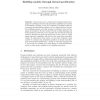851 search results - page 152 / 171 » Associative definition of programming languages |
CACM
1998
13 years 8 months ago
1998
rigorous, and abstract— clearly defined and generally agreed—type inheritance model. To quote an article by Taivalsaari: “The basic idea of inheritance is quite simple ... [a...
CI
2000
13 years 8 months ago
2000
Kowalski and Sergot's Event Calculus (EC) is a simple temporal formalism that, given a set of event occurrences, derives the maximal validity intervals (MVIs) over which prop...
JFP
2008
13 years 8 months ago
2008
Most programming languages adopt static binding, but for distributed programming an exclusive reliance on static binding is too restrictive: dynamic binding is required in various...
CPAIOR
2004
Springer
14 years 13 days ago
2004
Springer
Abstract. Over the past years, a number of increasingly expressive languages for modelling constraint and optimisation problems have evolved. In developing a strategy to ease the c...
ASPLOS
2010
ACM
14 years 1 months ago
2010
ACM
Heterogeneous computing combines general purpose CPUs with accelerators to efficiently execute both sequential control-intensive and data-parallel phases of applications. Existin...

